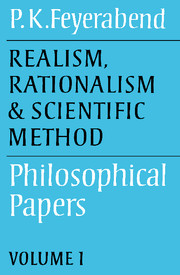Book contents
- Frontmatter
- Contents
- Introduction to volumes 1 and 2
- PART I ON THE INTERPRETATION OF SCIENTIFIC THEORIES
- PART 2 APPLICATIONS AND CRITICISMS
- 8 Introduction: proliferation and realism as methodological principles
- 9 Linguistic arguments and scientific method
- 10 Materialism and the mind–body problem
- 11 Realism and instrumentalism
- 12 A note on the problem of induction
- 13 On the quantum theory of measurement
- 14 Professor Bohm's philosophy of nature
- 15 Reichenbach's interpretation of quantum mechanics
- 16 Niels Bohr's world view
- 17 Hidden variables and the argument of Einstein, Podolsky and Rosen
- Sources
- Name index
- Subject index
14 - Professor Bohm's philosophy of nature
Published online by Cambridge University Press: 05 June 2012
- Frontmatter
- Contents
- Introduction to volumes 1 and 2
- PART I ON THE INTERPRETATION OF SCIENTIFIC THEORIES
- PART 2 APPLICATIONS AND CRITICISMS
- 8 Introduction: proliferation and realism as methodological principles
- 9 Linguistic arguments and scientific method
- 10 Materialism and the mind–body problem
- 11 Realism and instrumentalism
- 12 A note on the problem of induction
- 13 On the quantum theory of measurement
- 14 Professor Bohm's philosophy of nature
- 15 Reichenbach's interpretation of quantum mechanics
- 16 Niels Bohr's world view
- 17 Hidden variables and the argument of Einstein, Podolsky and Rosen
- Sources
- Name index
- Subject index
Summary
1. This is a belated review of a highly interesting and thought provoking book. Although dealing with some difficulties of a very specialized modern theory, the quantum theory, it should yet be of interest to the many non-physicists who want to know about the world we live in as well as about the ideas which are at present being developed for understanding this world. It is often assumed – and the basic philosophy of many contemporary physicists supports this assumption – that within the sciences speculation and ingenuity cannot play a very great role as physical theories are more or less uniquely determined by the facts. It is of course also assumed that our present knowledge about the microcosm is determined in exactly this way and is therefore irrevocable, at least in its main features. The book shows that this is not correct, it shows that today there exists a clash of ideas about some very fundamental things, that the imposing and perhaps a little terrifying picture of science as an unalterable and steadily increasing collection of facts is nothing but a myth, and that ingenuity and speculation play in physics as great a role as anywhere else. It also shows that even now it is possible to present difficult matters in an interesting and understandable way. It shows thereby that the separation, so often deplored, between the sciences and the humanities is due to a false picture, if not a caricature of science.
- Type
- Chapter
- Information
- Realism, Rationalism and Scientific MethodPhilosophical Papers, pp. 219 - 235Publisher: Cambridge University PressPrint publication year: 1981
- 2
- Cited by



